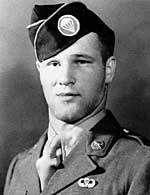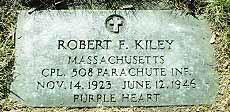|
 Soldat
américain. (Matricule: 11106372), Le caporal Robert F. Kiley est né le 14
Novembre 1923 à Miller's Falls dans le Massachusetts. Robert Kiley est un
des premiers Américains à sauter en parachute en Normandie. Il atterrit dans
un pommier où il est délogé par les
Allemands par une grenade. Blessé gravement à l'œil droit et à la jambe, il
est soigné dans un hôpital à Rennes, puis est incarcéré dans le camp 221 de
Saint-Jacques près de Rennes. Lorsque les Allemands évacuent ce camp face à
l'avancée des troupes terrestres américaines, lui et 39 autres prisonniers
sont enfermés dans un wagon de marchandises. Le 2 août, le train prend le
chemin de Redon, Nantes, Angers, Langeais et Belfort. Il est ensuite
emprisonné au Stalag VII A à proximité Moosburg, en Allemagne, jusqu'à la
fin de la guerre. Les anciens prisonniers du camp se rappelle de lui,
boitant dans le camp. Il le surnommait le "boxeur à l'œil de verre". Kiley a
été médicalement Il est libéré de l'armée le 31 mai 1946. Il meurt peu de
temps après à l'âge de 22 ans des suites de sa détention dans les camps. Soldat
américain. (Matricule: 11106372), Le caporal Robert F. Kiley est né le 14
Novembre 1923 à Miller's Falls dans le Massachusetts. Robert Kiley est un
des premiers Américains à sauter en parachute en Normandie. Il atterrit dans
un pommier où il est délogé par les
Allemands par une grenade. Blessé gravement à l'œil droit et à la jambe, il
est soigné dans un hôpital à Rennes, puis est incarcéré dans le camp 221 de
Saint-Jacques près de Rennes. Lorsque les Allemands évacuent ce camp face à
l'avancée des troupes terrestres américaines, lui et 39 autres prisonniers
sont enfermés dans un wagon de marchandises. Le 2 août, le train prend le
chemin de Redon, Nantes, Angers, Langeais et Belfort. Il est ensuite
emprisonné au Stalag VII A à proximité Moosburg, en Allemagne, jusqu'à la
fin de la guerre. Les anciens prisonniers du camp se rappelle de lui,
boitant dans le camp. Il le surnommait le "boxeur à l'œil de verre". Kiley a
été médicalement Il est libéré de l'armée le 31 mai 1946. Il meurt peu de
temps après à l'âge de 22 ans des suites de sa détention dans les camps.
 Service:
Corporal, Headquarters Company, Second Battalion, 508th
Parachute Infantry Regiment Service:
Corporal, Headquarters Company, Second Battalion, 508th
Parachute Infantry Regiment
Deceased: 12 June 1946
Burial Location: Calvary Cemetery, Greenfield, Massachusetts in
Lot 71 (Ascension Section), Grave 3.
Corporal Robert F. Kiley was born 14 November 1923 in Miller’s
Falls, Massachusetts. He graduated from Greenfield High School,
Greenfield, Massachusetts, in 1942. A classmate recalled Kiley
as being very outgoing and having “Hollywood good looks”.
He entered the service Nov 2, 1942, and after initial processing
at Fort Devens, Massachusetts, he completed his training at Fort
Blanding, Florida, and Camp Mackall, North Carolina. He received
his parachutist wings on March 5, 1943, and then served as an
81mm mortar crewman in Headquarters Company, Second Battalion,
508 Parachute Infantry Regiment.
Kiley departed Saltby, England, at 9:00 p.m. on the eve of D
Day, on board one of 900 C-47 troop carriers destined for
Normandy. The 508 Parachute Infantry Regiment, was among the
first Americans to land on French soil shortly after 2 a.m. on D
Day.
The trip across the English Channel was uneventful with a clear
night sky until the plane formations reached the French coast
where the troop carriers encountered heavy cloud cover and
accurate FLAK from German antiaircraft guns. The pilots broke
formation and took evasive action resulting in paratroopers
missing their designated drop zones and landing over a widely
dispersed area. Some paratroopers jumped at altitudes so high
that German gunners had ample time to train their guns on the
hapless parachutists; others jumped at altitudes so low that
their parachutes did not have time to deploy fully. Countless
others, weighed down by 80 pounds of gear, drown in the flooded
lowlands of the Merderet River.
After landing in an apple tree, Corporal Kiley engaged the
Germans in a fierce battle. The Germans threw a grenade into the
tree to dislodge Kiley. He was severely injured in the face and
leg and blinded in his right eye. Taken to the Rennes POW
Hospital, Kiley obtained from a German doctor one of only two
glass eyes in the hospital. After leaving Langeais, Kiley was
imprisoned at Stalag VIIA near Moosburg, Germany, until the end
of the war. Kiley boxed while in prison camp and was vividly
remembered by former POWs as “the boxer with the glass eye”.
Upon his return to the United States, Kiley was intermittently
hospitalized during his convalescence from his battle injuries
and the ravages of POW captivity. He met with the Alexander
Kowalski family and recounted the story of the strafing attack at Langeais.
story of the strafing attack at Langeais.

In an attempt to allay his family’s concerns about his wartime
experiences, Kiley described his military and POW service as an
adventure and tried to present all the positive things until his
father said, "If it was so much fun, why did you come home?"
The Army medically discharged Kiley on 31 May 1946. Twelve days
later, at the age of 22 years, he died suddenly and unexpectedly
on 12 June 1946 of an undisclosed cause. His survivors included
his father, Timothy Kiley; his brothers, John, of Millers Falls;
Wilfred, of Mamaroneck, New York; and Richard of Arlington,
Massachusetts; and his sister, Mrs. Victor Ward of Orange,
Massachusetts. His mother, Mabel Merritt Kiley, preceded him in
death.
PFC Kiley’s Awards
 |
 |
 |
 |
| Combat Infantry Badge |
Bronze Star |
Purple Heart
|
Presidential Unit Citation
|
|
(Source: Jo Anna Shipley (Louisville, KY 40204)
|
![]() 35memoiredeguerre@gmail.com
35memoiredeguerre@gmail.com